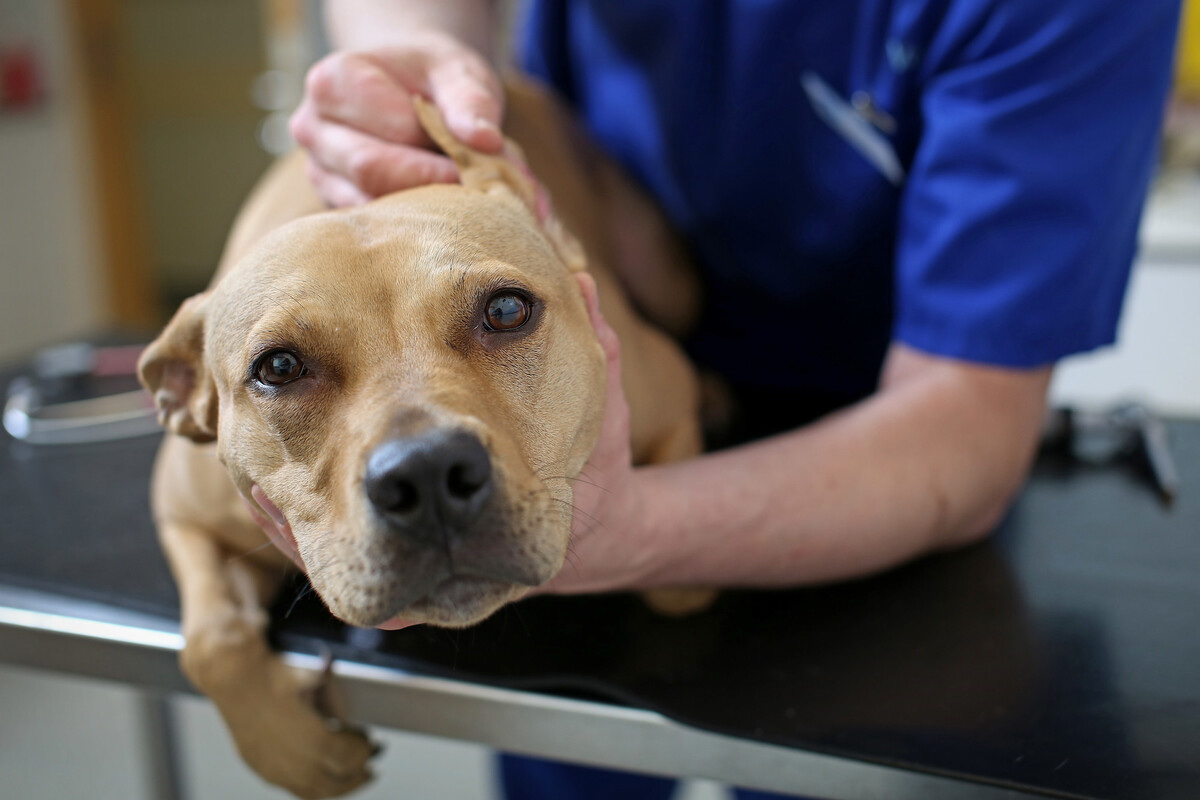Home>Health & Wellness>Common Health Issues>What Does Prednisone Do For Dogs With Cancer?


Common Health Issues
What Does Prednisone Do For Dogs With Cancer?
Published: February 4, 2024
Learn how prednisone can help manage common health issues in dogs with cancer, including its benefits and potential side effects. Discover the role of prednisone in treating cancer in dogs.
(Many of the links in this article redirect to a specific reviewed product. Your purchase of these products through affiliate links helps to generate commission for Pawsomeoldies.com, at no extra cost. Learn more)
Table of Contents
Introduction
Cancer is a formidable adversary, not only for humans but also for our beloved canine companions. When a dog is diagnosed with cancer, it can be a distressing and overwhelming experience for pet owners. In such challenging times, veterinarians often prescribe medications to alleviate symptoms and improve the dog's quality of life. One such medication that is commonly used in cancer treatment for dogs is prednisone.
Prednisone is a corticosteroid that plays a crucial role in managing various health conditions in dogs, including cancer. Understanding the function and impact of prednisone is essential for pet owners who are navigating the complexities of their dog's cancer treatment. This article aims to shed light on the role of prednisone in the context of canine cancer treatment, its potential benefits, and the associated side effects. By gaining a deeper understanding of prednisone, pet owners can make informed decisions and provide the best possible care for their furry companions during this challenging time.
Understanding Prednisone
Prednisone is a synthetic corticosteroid that mimics the actions of cortisol, a hormone naturally produced by the adrenal glands. It belongs to a class of medications known as glucocorticoids, which exert a wide range of effects on the body's immune response, metabolism, and inflammation. In the context of cancer treatment for dogs, prednisone is often prescribed to manage symptoms and improve the overall well-being of the canine patient.
One of the key functions of prednisone is its anti-inflammatory properties. In dogs with cancer, inflammation can contribute to discomfort, pain, and swelling in affected tissues. By reducing inflammation, prednisone can help alleviate these symptoms, thereby enhancing the dog's comfort and quality of life. Additionally, prednisone is known for its immunosuppressive effects, which can be beneficial in certain cancer cases where the immune system's overactivity contributes to the progression of the disease.
Furthermore, prednisone plays a role in modulating the body's response to stress. This can be particularly relevant for dogs undergoing cancer treatment, as the disease and its associated therapies can place significant physical and emotional stress on the animal. By helping the body adapt to stress more effectively, prednisone may contribute to a dog's overall resilience and ability to cope with the challenges posed by cancer.
It's important to note that prednisone should only be used under the guidance of a veterinarian, as its dosage and duration of use must be carefully tailored to the specific needs of the individual dog. Moreover, while prednisone offers valuable benefits in managing cancer-related symptoms, it is not a curative treatment for cancer itself. Instead, it serves as a supportive measure to enhance the dog's comfort and well-being as they undergo cancer treatment.
In summary, prednisone is a multifaceted medication that exerts anti-inflammatory, immunosuppressive, and stress-modulating effects in dogs. When integrated into a comprehensive cancer treatment plan, prednisone can contribute to improving the quality of life for dogs facing the challenges of cancer. Understanding the mechanisms and potential benefits of prednisone is essential for pet owners and veterinarians alike, as it empowers them to make informed decisions and provide compassionate care for canine cancer patients.
Prednisone's Role in Cancer Treatment for Dogs
Prednisone plays a significant role in the comprehensive treatment of cancer in dogs. While it is not a direct anticancer agent, its therapeutic impact is invaluable in managing the symptoms and side effects associated with canine cancer. When a dog is diagnosed with cancer, the disease can manifest in various ways, including pain, inflammation, loss of appetite, and overall discomfort. Prednisone, with its anti-inflammatory properties, can effectively alleviate these symptoms, thereby enhancing the dog's quality of life during the course of cancer treatment.
In the context of cancer, prednisone is often prescribed to reduce swelling and pain in affected tissues. Tumors and cancerous growths can exert pressure on surrounding tissues, leading to inflammation and discomfort for the dog. By mitigating this inflammatory response, prednisone helps alleviate the physical distress experienced by the canine patient. This reduction in discomfort is particularly crucial in enhancing the dog's overall well-being and enabling them to maintain a good quality of life despite the challenges posed by cancer.
Moreover, prednisone's immunosuppressive effects can be beneficial in certain cancer cases. In some instances, the immune system's overactivity can exacerbate the progression of the disease. By modulating the immune response, prednisone can help manage the immune-mediated aspects of cancer, contributing to a more balanced and controlled disease state in the dog. This aspect of prednisone's action underscores its role as a supportive therapy in cancer treatment, working in tandem with other modalities to address the multifaceted nature of the disease.
Additionally, prednisone's ability to modulate the body's response to stress is particularly relevant for dogs undergoing cancer treatment. The emotional and physical toll of cancer and its associated therapies can place significant stress on the canine patient. Prednisone's stress-modulating effects can help the dog adapt to these challenges more effectively, potentially enhancing their resilience and ability to cope with the demands of cancer treatment.
In essence, prednisone serves as a valuable component of the holistic approach to cancer treatment in dogs. While it does not directly target the cancer cells, its role in managing symptoms, reducing inflammation, and modulating the immune response contributes to an improved quality of life for the canine patient. By integrating prednisone into the overall treatment plan, veterinarians aim to alleviate the dog's discomfort, enhance their well-being, and support them through the complexities of cancer treatment. This multifaceted role underscores the importance of prednisone as a supportive measure in the comprehensive care of dogs facing the challenges of cancer.
Side Effects of Prednisone in Dogs
While prednisone offers valuable benefits in managing symptoms and improving the quality of life for dogs undergoing cancer treatment, it is important to be mindful of potential side effects associated with its use. Understanding these side effects is crucial for pet owners and veterinarians, as it enables them to monitor the dog's well-being effectively and address any adverse reactions promptly.
One of the primary side effects of prednisone in dogs is increased thirst and urination. This is known as polydipsia (excessive thirst) and polyuria (excessive urination). Prednisone can lead to an imbalance in the body's fluid regulation, causing the dog to drink more water and consequently urinate more frequently. Pet owners should be observant of changes in their dog's drinking and urination patterns while on prednisone and report any significant deviations to the veterinarian.
Furthermore, prednisone can induce an increase in appetite, leading to excessive hunger in dogs. This heightened appetite, known as polyphagia, can result in weight gain if not managed carefully. Pet owners should monitor their dog's food intake and ensure that dietary adjustments are made to prevent excessive weight gain while the dog is on prednisone.
Another potential side effect of prednisone is the suppression of the immune system. While this immunosuppressive effect can be beneficial in certain medical conditions, it also increases the dog's susceptibility to infections. Pet owners should be vigilant for signs of illness or infection in their dog and seek prompt veterinary attention if any concerns arise.
Additionally, prednisone can impact the dog's behavior and mood. Some dogs may exhibit changes in their demeanor, such as increased restlessness or lethargy. It is important for pet owners to observe their dog's behavior closely and communicate any noticeable changes to the veterinarian.
Moreover, prednisone can have gastrointestinal effects, including vomiting and diarrhea. These symptoms can contribute to discomfort and dehydration in the dog. Pet owners should monitor their dog's digestive health and report any gastrointestinal disturbances to the veterinarian for appropriate management.
In some cases, prolonged use of prednisone can lead to more severe side effects, such as muscle weakness, thinning of the skin, and delayed wound healing. These effects underscore the importance of closely monitoring the dog's response to prednisone and collaborating with the veterinarian to mitigate potential adverse reactions.
In summary, while prednisone plays a valuable role in managing cancer-related symptoms in dogs, it is essential to be mindful of potential side effects that may arise during its use. By staying attentive to changes in the dog's thirst, appetite, behavior, and overall well-being, pet owners can work in partnership with their veterinarian to ensure that the dog receives the best possible care while undergoing prednisone treatment as part of their cancer management plan.
Conclusion
In conclusion, prednisone serves as a valuable ally in the comprehensive care of dogs undergoing cancer treatment. Its multifaceted role in managing symptoms, reducing inflammation, and modulating the immune response contributes to an improved quality of life for canine patients facing the challenges of cancer. By alleviating discomfort, enhancing resilience, and supporting the dog's well-being, prednisone plays a pivotal role in the holistic approach to cancer management in dogs.
While prednisone offers significant benefits, it is important for pet owners and veterinarians to remain vigilant for potential side effects associated with its use. Monitoring the dog's thirst, appetite, behavior, and overall well-being is essential in ensuring that any adverse reactions are promptly addressed, thus optimizing the dog's comfort and safety throughout the course of prednisone treatment.
Ultimately, the integration of prednisone into the cancer treatment plan for dogs underscores the commitment to providing compassionate and comprehensive care for canine patients. By understanding the mechanisms and potential impacts of prednisone, pet owners and veterinarians can work collaboratively to navigate the complexities of cancer treatment, empowering them to make informed decisions and prioritize the well-being of their furry companions.
In the journey of cancer treatment for dogs, prednisone stands as a supportive measure, offering comfort, relief, and resilience in the face of adversity. Its role in managing symptoms and enhancing the dog's quality of life exemplifies the dedication to ensuring that every canine patient receives the utmost care and support throughout their cancer treatment journey.















